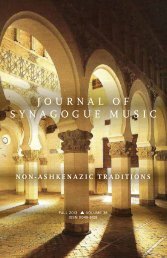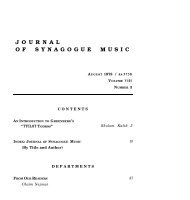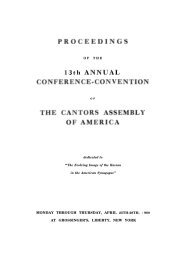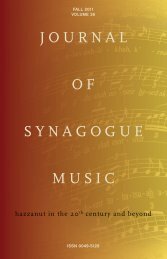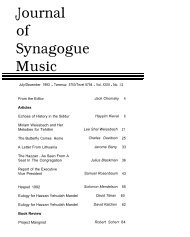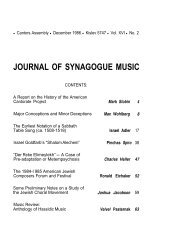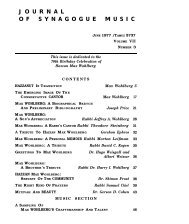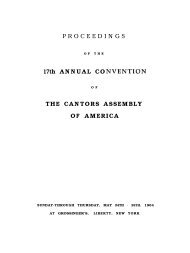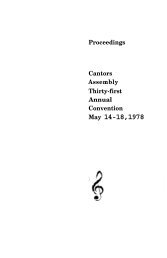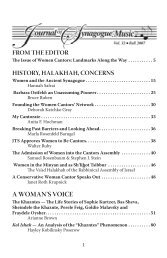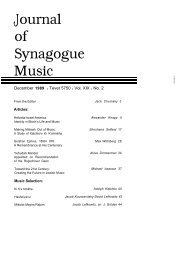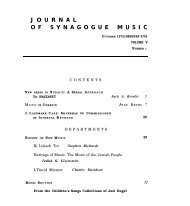ninth annual conference-convention - Cantors Assembly
ninth annual conference-convention - Cantors Assembly
ninth annual conference-convention - Cantors Assembly
You also want an ePaper? Increase the reach of your titles
YUMPU automatically turns print PDFs into web optimized ePapers that Google loves.
While in the past the synagogue was, almost exclusively,<br />
a place of worship, the Conservative synagogue<br />
of today is the center of every other phase of Jewish<br />
life as well:-cultural, educational, social and communal.<br />
The success of the Conservative synagogue<br />
can be judged by the fervent and unceasing hum of<br />
activities in and around it every day of the year:children<br />
in the classrooms, assemblies, choral groups,<br />
dramatic groups, club meetings, social affairs, Men’s<br />
clubs, Sisterhoods, and ever so many more fields of<br />
particpiation for the community to live Jewishly.<br />
We are proud of the integral and inseparable part<br />
the Hazzan has in this new picture. Aside from his<br />
duties as Sh’liach Tzibur, you may find the Hazzan<br />
leading an enthusiastic group of children in song; you<br />
may find him training children and adult choral<br />
groups; you may find him advising and assisting a<br />
club in its holiday presentation. In short, you may<br />
find him wherever a musical activity takes place. He<br />
is the all-embracing musical personality of his congregation,<br />
charged with the sacred duty of preserving<br />
our musical heritage and imparting a genuine love for<br />
it to young and old; charged with the creative task of<br />
imparting a joyful Judaism wherever his sphere of<br />
influence exists.<br />
Our Workshop today will concern itself primarily<br />
with the musical activities of the Hazzan in relation<br />
to the youth of the synagogue.<br />
The outline of the Workshop is as follows:<br />
I. Music in the Classroom.<br />
II. Bar-Mitzvah, Torah Readers.<br />
III. Youth Choral Groups.<br />
IV. Children’s Services.<br />
“Tafasta m’rubah, lo tafasta.” The scope of today’s<br />
Workshop is enormous and our time is limited. It<br />
would be impossible to cover thoroughly, today, even<br />
one phase of our Workshop, let alone to give all the<br />
activities listed the complete treatment they deserve.<br />
I shall be satisfied if today’s discussion will create<br />
enough interest among our members to warrant further<br />
detailed studies of each of the activities involved<br />
at future <strong>convention</strong>s, or if our Regional Branches<br />
will, as a result of today’s discussion, set up similar<br />
Workshops as part of their regular programs.<br />
In order to utilize, to the best advantage, the limited<br />
time available to us today, we shall concentrate<br />
on the practical highlights of the activities mentioned.<br />
However, before we start with the discussion of<br />
these activities, we should consider first a few of the<br />
special problems that are unique to the Hazzan who<br />
is also engaged in education work.<br />
Historically, and psychologically, the field of Hazzanuth<br />
and pedagogy are totally unrelated. up to<br />
now our extensive preparation for the Hazzanate did<br />
not include any reference to teaching methods, techniques,<br />
or materials. Those among us who have gone<br />
through a Teacher’s College have done so not as a<br />
part of our training for the Hazzanate but aside from<br />
- 18 -<br />
it. We all recognize that the ability to teach is not<br />
an inherent trait, any more than does the ability to<br />
sing require merely a fine voice without development.<br />
Teaching is a highly skilled art that should not be<br />
taken for granted or regarded lightly.<br />
The Hazzan, as a teacher, must make allowance for<br />
many unpredictable and unavoidable absenses that<br />
may upset an organized school program. His duties<br />
at funerals, for example, may cause the Hazzan to be<br />
absent from school several times in one week There<br />
are also periods, such as the High Holiday season,<br />
when a Hazzan should do no teaching at all.<br />
The most important function of the Hazzan is still,<br />
and will always be, that of Sh’liach Txibur and he<br />
owes it to his congregation as well as to himself carefully<br />
to guard his voice and his heath. He must see to<br />
it that he performs his duties when he is at his best<br />
and he must avoid any danger that will prevent him<br />
from doing so. Excessive teaching can be very harmful<br />
to the voice since there is no such thing as “taking<br />
it easy” while teaching. This is a job that knows no<br />
half measures.<br />
These are some considerations that may be a hindrance<br />
in the role of the Hazzan as a teacher. On the<br />
other hand there are many other factors that are in<br />
his favor:<br />
Unlike the regular music teacher, the Hazzan is prepared<br />
to deal with the voice as a performing mechanism.<br />
He has a thorough knowledge of breath control,<br />
tone production and correct diction. The chances are<br />
that he will know how to handle boy’s voices so that<br />
their natuaral beauty will be preserved and extended<br />
and that he will bring them through the voice-change<br />
period unimpaired.<br />
Unlike the regular teacher, who as a rule is engaged<br />
in the morning in another job, the Hazzan’s exclusive<br />
affiliation and loyalty is to one synagogue. He can budget<br />
his time so that he can come to his classes well<br />
prepared, with complete absorption, and fresh. His<br />
subject matter is one that most children find interesting<br />
and a lot of fun. Indeed, the Hazzan can easily<br />
become the refreshing and rejuvenating spirit in the<br />
school.<br />
Finally, the respect that the children have for the<br />
office of Hazzan, can serve in hie favor in his contact<br />
with them. If the Hazzan does not abuse the privileges<br />
of his office, he will find that most children feel honored<br />
and flattered to come in contact with him and that they<br />
appreciate no end any personal relations with him. The<br />
Hazzan has thus a powerful and direct influence on<br />
the children of his congregation. This important influence<br />
upon the youth of today might well become a<br />
deciding factor in the shape of the synagogue in years<br />
to come.<br />
We must ever recognize the importance of our role<br />
in this light and guide our activities accordingly.<br />
Now that we have touched upon the initial problems<br />
of the Hazzan as an educator, we can proceed to the<br />
details of our outlined Workshop.



